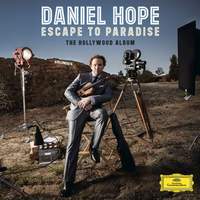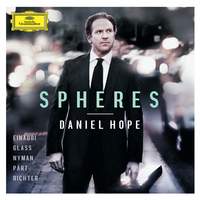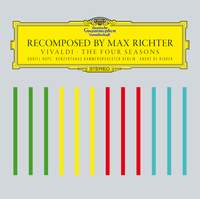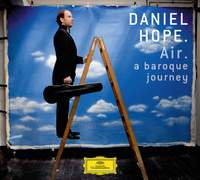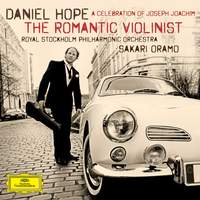Interview,
Daniel Hope - Escape to Paradise
 Violinist Daniel Hope is known for producing what can only be called classical ‘concept albums’ - personal selections of pieces that explore a certain theme or story. His latest disc, Escape to Paradise, traces the lives of some of the composers whose flight from the Third Reich led them to work in Hollywood during its Golden Age – music for the American big screen but very often with a look backward to the vanished communities of the Old World.
Violinist Daniel Hope is known for producing what can only be called classical ‘concept albums’ - personal selections of pieces that explore a certain theme or story. His latest disc, Escape to Paradise, traces the lives of some of the composers whose flight from the Third Reich led them to work in Hollywood during its Golden Age – music for the American big screen but very often with a look backward to the vanished communities of the Old World.
I caught up with Daniel to explore the ideas behind this fascinating album further.
Nearly half the tracks on this album seem to be “love themes”, or themes from films – did you find building an album up from these relatively short, motif-like pieces very different from putting together a more “conventional” selection?
>I don’t really do “conventional”. Every one of my 25 albums to date has had its own challenges, especially when it comes to putting together the track listing. I agonize over it for months until I have the feeling that the album works as a whole, that it tells a story.
Indeed, why so many love themes at all? They’re often among the most memorable tunes in a soundtrack, but they don’t necessarily sit very well with the theme of composers in exile...
>Of 18 tracks I count 4 Love Themes. I wanted to show what the European ear and psyche was listening to before the departure of certain composers, from the 11 year old Korngold and the end of the Wagner-Mahler-Zemlinsky era to the Berlin show and film songs of the 1920s and 1930s – the music that my Berlin grandparents adored. I also thought it important to demonstrate how the sound of those composers changed after their arrival in Hollywood. At the same time, the audacious demands on the composers in the Hollywood hothouse intrigued me: a former pupil of Ravel might have to write a Viennese waltz one minute, a cowboy song or a can-can the next. I soon realised that the tracklisting was becoming an examination of “escape” in its many forms: the physical, forced departure from Europe; the escape from within the form of the music itself, which must have been baffling to many of the composers; and, in no small way, the escapism of the silver screen and what it meant and still means to so many.
Almost all the pieces on the album are arrangements for solo violin with various accompanying forces – you had the whole orchestral gamut of the Golden Age of Hollywood to pick from and adapt. Were there any numbers that you wanted to include but which just didn’t work in new arrangements as solo items?
>Most of these solos were originally written for violin and orchestra, those that were not we adapted. It was my wish to give the arrangements that Golden Age, Hollywood sound, and that was done magnificently by Paul Bateman, one of today’s greatest arrangers and someone with a real sense of the style. There were literally hundreds of pieces we could have selected and I do believe almost all of them would have worked. I was also advised by Erich Zeisl’s daughter and Franz Waxman’s son when making my selection. In the archives of Paramount Studios I found handwritten tunes by Korngold which have never seen the light of day. But at the end of the day, a CD is only 80 minutes…
It’s no surprise that a lot of the composers featured on the disc are of Jewish background – given this, and the considerable Jewish musical community that already existed in America in the early 20th Century, do you think it’s reasonable (as some have done) to view that Golden Age as being set to a soundtrack with a distinctively Jewish heritage – or is that an oversimplification?
>I think the original Hollywood Sound was an amalgamation of many different elements. On the one hand an intrinsically central European expression that met the sweeping gestures of Hollywood in an age when big was the requirement. The fact that not only most of the composers were Jewish, but so many of the studio musicians who actually created that sound on tape as well, many of whom had been kicked out of some of the finest orchestras in Europe, does underline the fact that the Jewish presence in the soundworld of Hollywood was a strong and important one.
Do you think Hollywood really was a “paradise” for composers fleeing the turmoil in Europe? Given that many of them didn’t really choose to move there and the musical environment of the film industry was hardly utopian, couldn’t it also be seen as a form of involuntary exile, more of an exodus than a Promised Land?
>I called the album “Escape to Paradise”, which is actually a nod to Klaus Mann’s book on the Hollywood Exiles, “Escape to Life”. It was Arnold Schoenberg who called Hollywood “paradise”, a fact that his son, Ronald, confirmed to me during our interviews. For many, Hollywood was hell. They were not able to find a footing, they did not speak the language and they were desperately homesick. One surviving Hollywood Exile composer, Walter Arlen, now 94, told me that those love themes were also, for many, a nostalgic look back to a lost world. You can hear music on the album by Erich Zeisl, someone who did not succeed in Hollywood. Joseph Roth’s novel Job, adapted for Zeisl’s opera by the Hollywood scriptwriter Hans Kafka and from which I play “Menuhim’s Song”, deals with escape from Europe to America, where the central character discovers not a paradise but a hell. For me, Zeisl – who shunned Hollywood’s industry – is a forgotten master.
Escape to Paradise - The Hollywood Album is out now on Deutsche Grammophon.
Available Formats: MP3, FLAC, Hi-Res FLAC
Other releases from Daniel Hope
Spheres is a widely varied album based on the ancient Pythagorean idea that the movement of the planets creates a kind of musical harmony.
Available Formats: MP3, FLAC
Max Richter's Vivaldi Recomposed is a mixture of homage and arrangement - a 'remix' of Vivaldi's Four Seasons in an ambient, electronic form, featuring Hope as the soloist.
Available Formats: CD + DVD Video, MP3, FLAC, Hi-Res FLAC
In Air, Hope picks out works that showcase the variety of Baroque writing for solo violin - from well-established masterpieces such as Bach's Air on the G string to lesser-known deligts such as Valente's Neapolitan Galliard.
Available Formats: MP3, FLAC
The nineteenth-century king of the violin, Joseph Joachim, is the focus of this album – featuring not only works composed for him to perform (such as Bruch's immortal Concerto No. 1) but also two pieces written by Joachim himself.
Available Formats: MP3, FLAC


